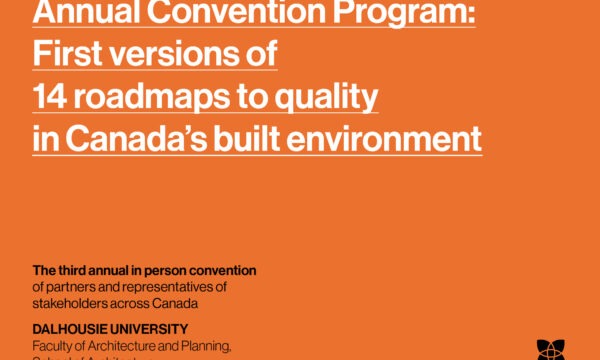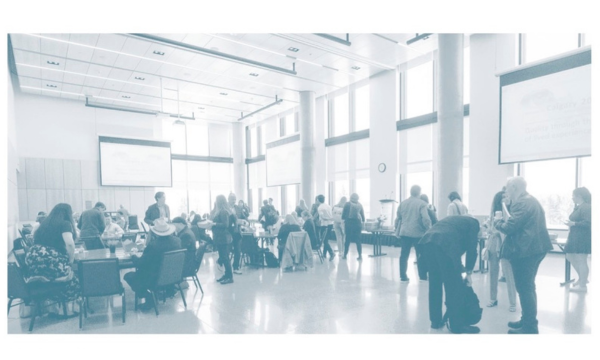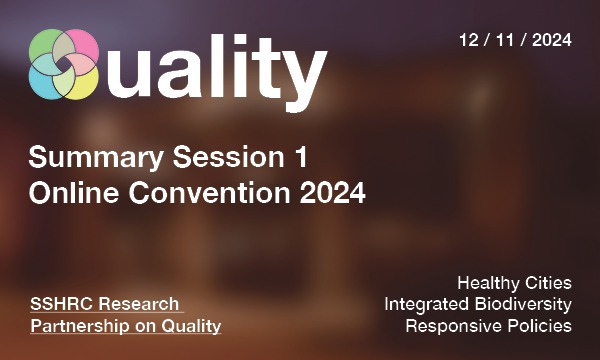As part of the highlights of the SSHRC-funded Partnership Project: Quality in Canada’s Built Environment (QBE), we are pleased to share that three of our site teams — from Calgary, Halifax, and Toronto — presented at the international Environmental Design Research Association (EDRA56) conference in Halifax, which marked EDRA’s first return to Canada after almost 20 years, since 2005.
Titled “Advancing Quality in Canada’s Built Environment: Integrating Inclusive Design and Healthy Cities through Transdisciplinary Collaboration,” the session aligned closely with the EDRA56 conference theme: Designing Communities for Climate Action and Resilience. This panel brought together QBE researchers working on the ground in different regional contexts to explore how inclusive design and health-centered planning can contribute to more equitable, sustainable, and resilient communities.
The event opened with a thoughtful video message from partnership lead Jean-Pierre Chupin, followed by site-specific presentations and a rich panel discussion moderated by Alex McLean ZUPPA Circus Theatre Society.
Panel Presenters:
Nooshin Esmaeili, Architect, AAA
School of Architecture, Planning and Landscape (SAPL), University of Calgary
Brian Lilley, Associate Professor
School of Architecture, Dalhousie University, Halifax
Marco L. Polo, OAA, FRAIC, Professor
Department of Architectural Science, Toronto Metropolitan University (TMU)
The project advances three core objectives:
- Identify and address gaps in current environmental standards and sustainability models to better align design and planning practices.
- Co-create inclusive frameworks that advance equity, diversity, and accessibility in architectural and urban spaces through community-driven engagement and transdisciplinary collaboration.
- Develop actionable roadmaps that enhance the social value of the built environment and promote health, well-being, and inclusion.
Highlights from the Three Sites:
Calgary – Healthy Cities
Presented by Nooshin Esmaeili (University of Calgary), this site focuses on holistic, community-informed approaches to urban design that prioritize health and well-being.
Key actions:
- Embedding design literacy in K–12 education
- Advancing municipal policy that connects design quality to health outcomes
- Proposing a national certification framework for systems-based design
Halifax – Belonging in Learning Environments
Brian Lilley (Dalhousie University) presented on enhancing belonging and lived experience in Nova Scotia’s schools and learning spaces. Brian Lilley (Dalhousie University) shared their team’s roadmap, which promotes a more inclusive and supportive learning environment:
- Ensuring that the community’s needs are at the forefront of the design process
- Creating flexible, accessible, and contextually responsive learning environments
- Aligning physical spaces with their users’ lived experiences and needs, promoting a more inclusive and supportive learning environment.
Toronto (TMU) – Equity and Well-being on the Waterfront
One of two Toronto sites, the Toronto Metropolitan University (TMU) team explores Equity and Well-being on Toronto’s Waterfront through the initiative “Let’s All Meet by the Lake.” Site leader Marco L. Polo presented how their roadmap pushes to expand assessment of design excellence by including health, accessibility, and inclusion.
Key actions:
- Embed Accessibility and Inclusion in a Scaffolded Collaborative Curriculum (Pedagogy)
- Advance Understanding of Lived Experiences and other updated criteria in the Recognition of Quality (Awards Programs)
- Promote Community-Centered Engagement Methods in Professional Practice (Continuing Education)
The session was moderated by Alex McLean, co-artistic director of Halifax-based Zuppa Theatre Co., who brought a creative, interdisciplinary lens to the dialogue. His background in storytelling and place-based engagement helped bridge the gap between research, design, and public imagination.



